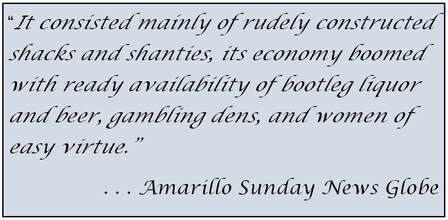Belle Plain
By Glynda Pflug
The oil and gas boom in the 1920's prompted the rise of numerous towns. One of those Borger and a little town on the eastern edge of Moore County -- Belle Plain.
Borger police and law enforcement began trying to control the lawless conditions in their booming town and many of the "less reputable" members of the population shifted their illicit operations to a new townsite just across the county in Moore County.
According to Chester Logue, Moore County Sheriff from 1928 to 1936, "When they began to clamp down on booze in Borger, a lot of the bootleggers and strumpets just moved over to Belle Plain. They came about a year before I took office, and lasted about a year after."
Land for the town was on the Byrd-Armstrong ranch and occupied an area of about a block of the southside of the Borger highway. By present day landmarks, the town would be near the intersection of State Highway 152 and FM 1913, the access road to Lake Meredith recreation area.
Borger police and law enforcement began trying to control the lawless conditions in their booming town and many of the "less reputable" members of the population shifted their illicit operations to a new townsite just across the county in Moore County.
According to Chester Logue, Moore County Sheriff from 1928 to 1936, "When they began to clamp down on booze in Borger, a lot of the bootleggers and strumpets just moved over to Belle Plain. They came about a year before I took office, and lasted about a year after."
Land for the town was on the Byrd-Armstrong ranch and occupied an area of about a block of the southside of the Borger highway. By present day landmarks, the town would be near the intersection of State Highway 152 and FM 1913, the access road to Lake Meredith recreation area.
Lots were advertised by the Belle Plain Townsite Co. for $50 to $250. One newspaper ad stated "Choice lots are decreasing rapidly." The town was advertised as the "second largest in Moore County." Streets were named Byrd, Proctor and Freeman.
Another development was tried across the highway and would have been called Burden. In an interview, Walter Powell stated, "Old P. W. Burden tried to develop that, but I don't believe that he ever sold a lot."
Belle Plain reached its peak about 1929 and was the center of some 14 oil wells, two carbon black plants. It had two hotels, two cafes, a drug store, barber shop and post office, but almost no permanent residents.
In a story in the Amarillo Sunday News Globe in 1986, the town was described, "It consisted mainly of rudely constructed shacks and shanties, its economy boomed with ready availability of bootleg liquor and beer, gambling dens, and women of easy virtue."
Articles in: Amarillo Sunday News Globe and Moore County News Press
Another development was tried across the highway and would have been called Burden. In an interview, Walter Powell stated, "Old P. W. Burden tried to develop that, but I don't believe that he ever sold a lot."
Belle Plain reached its peak about 1929 and was the center of some 14 oil wells, two carbon black plants. It had two hotels, two cafes, a drug store, barber shop and post office, but almost no permanent residents.
In a story in the Amarillo Sunday News Globe in 1986, the town was described, "It consisted mainly of rudely constructed shacks and shanties, its economy boomed with ready availability of bootleg liquor and beer, gambling dens, and women of easy virtue."
- According to a story in The Moore County News Press in 1976, "Most of its key business people -- bootleggers -- wound up in district court. In a 2-year period, Sheriff Logue made some 16 bootlegging and gambling arrests, most of them in Belle Plain."
- He arrested both men and women for adultery -- then against the law in Texas -- and for vagrancy, mainly for offenses in which prostitution was suspected.
- The article went on to say, "The bootleggers who went to jail was prosecuted, but did not stay behind bars. Two leading figures in the moonshine trade were sentenced to prison terms, but afterwards posted handsome bonds and apparently ran off."
- Those arrested for adultery and prostitution were not prosecuted, probably because the women involved (former Borger bawdyhouse belles) skipped out of the county.
- In the 1976 story, Logue states, "I ran them off from Belle Plain, because I didn't think all that ought to go on."
- Logue's efforts to "clean-up" the town worked. By 1932, fewer arrests were made and with the end of National Prohibition in 1933, the end of Belle Plain started. Almost as quickly as the town was born, its residents moved away to other oil camps and surrounding towns. Many of the buildings were moved to Sunray or were abandoned. By mid-1930's Belle Plain had ceased to exist as a town.
Articles in: Amarillo Sunday News Globe and Moore County News Press
